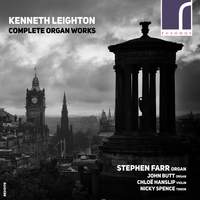Interview,
Stephen Farr on Leighton's Organ Works
 The music of Kenneth Leighton is instantly recognisable - lyrical and approachable, yet often with acerbic, dissonant elements. While many may think of him primarily as a choral composer, his output for the organ was also considerable - and it's this side of Leighton's music that Stephen Farr highlights in his new recording of his complete works for organ.
The music of Kenneth Leighton is instantly recognisable - lyrical and approachable, yet often with acerbic, dissonant elements. While many may think of him primarily as a choral composer, his output for the organ was also considerable - and it's this side of Leighton's music that Stephen Farr highlights in his new recording of his complete works for organ.
I spoke to Stephen about this sizeable project, and about Leighton's relationship with the instrument.
The notes accompanying this album remark on Leighton’s initial unfamiliarity with the organ, and suggest that writing for it remained challenging for him throughout his career. Do you think he successfully overcame these difficulties, or are there still hints in his organ music that it was not his most natural artistic medium?
I think he overcame them entirely: even if he found the instrument a challenge to write for, there isn't a note in the organ works which isn't entirely idiomatic for the instrument. In fact he often manages his textures and technical demands rather better than composers who are also organists. Martyrs is a masterpiece in this regard - the management of the possibilities and pitfalls of the textures obtainable by two players at one instrument is faultlessly judged. And of course composers in all sorts of mediums write superbly well for instruments they don't play themselves.
Indeed, do you see any overall trends in Leighton’s compositional style through his life – not merely becoming more familiar and comfortable with the organ as an instrument, but developing more generally as a composer as well?
I think it's probably true to say that by the time he came to writing for the organ his compositional style was at full maturity: there's no perceptible sense for me that the earlier works are in any way less stylistically convincing than the later, and the defining elements of his language seem to be present throughout. And his organ writing is absolutely idiomatic in all these works, the earlier as well as the later: I don't think he changed his approach to writing for the instrument at all.
Given Leighton’s musical upbringing as a chorister, and his considerable output of choral music for the church, not to mention the sacred leanings of almost all these organ pieces, do you think it might be a little artificial to separate them off and present them separately in an all-organ album?
It would (alas) be way beyond the scope of this project to record everything Leighton ever wrote which involved the organ in any capacity, although I'd love to do it if someone would like to fund it - it would be a fascinating contextual exercise and maybe illuminate some interesting aspects of the two genres. But on the broader point, I don't think it's artificial to record the organ solo works (and the collaborative pieces) as a discrete group, divorced from the church music, even though as you say many of them have some sort of theological or religious concept underlying them. Other instances come very easily to mind of repertoires where a composer uses the same instrument in different genres - Brahms lieder and piano solo works, for example - and I think this is a similar situation, showing his use of the instrument in one clearly defined context.
There are three organs on this album – in Edinburgh, Birmingham and London. Did you deliberately pair different pieces up with different instruments that you felt would suit them best, or was it a more pragmatic (and prosaic) decision of simple logistics?
Yes, and to a lesser extent, yes! We went to Edinburgh for the first and last volumes because of the obvious connections with Leighton. Also because the Rieger records stupendously well, and has all the clarity and incisiveness the music needs. It also happens to be one of my favourite organs... The major concert works on volume 2 need an organ with more than one enclosed division (especially for the voice and organ piece) and also some powerful solo reeds of the kind the Rieger doesn't possess. So the Klais was ideal, as it has all the attributes but also has the clarity of the Edinburgh Rieger. The choice of organ for Es ist genug proved really challenging; it needs something with two enclosed divisions, lots of soft colour, and the possibility for the organist and violinist to be in very close proximity, so St Paul's proved a really excellent solution.
Stephen Farr's complete set of Leighton's organ music was released on 20th January on Resonus Classics.
Available Formats: 3 CDs, MP3, FLAC, Hi-Res FLAC



